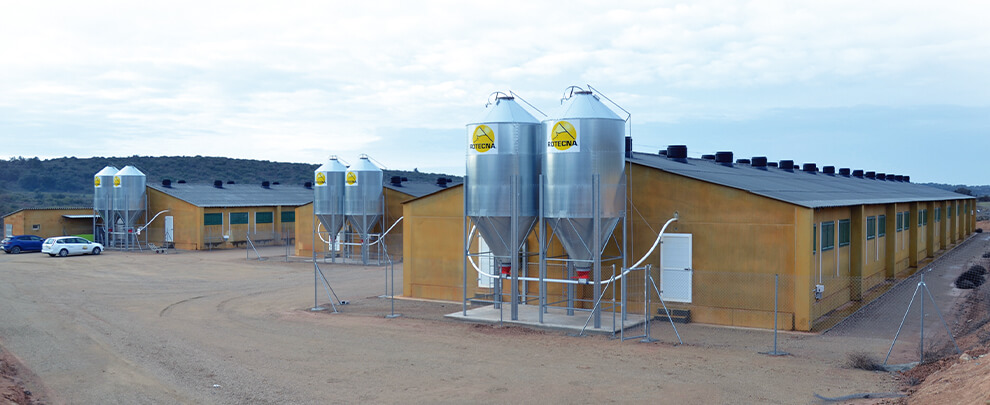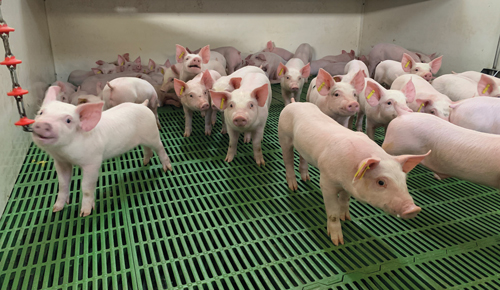Blog
Blog

This is how things are done on our farms
22nd June 2023 - News
Óscar Toledano. Sales Manager & BI Rotecna.
We see attacks against the pork sector in the media and networks every day, but we should not allow public opinion to think that we do not have the means or the will to produce high-quality meat, with high animal welfare and in a completely sustainable way, because it is not true.
It is vital that we make our story known, many of us strive towards that every day, contributing to things being done as well as possible, and that the sector does not stop improving; we should explain what we do, and the impact it has, since we know first-hand how pork production works.
We should ensure that the pork sector is not accused of having a big negative impact on climate change, because that is not the case.
According to the Spanish emissions inventory system, those derived from pork production represent only 2% of the country’s total GHG emissions (despite being the 3rd world producer and that the sector represents almost 2% of the total national GDP and 15% of Industrial GDP). On the other hand, a single return flight from Rome to Brussels emits more greenhouse gases per passenger than the production of meat consumed by one person in a year. We must also help people understand that part of our animals’ diet is based on by-products of the food industry and parts of plants that are not digestible by humans.
In any case, we have made significant progress in reducing overall emissions and water use per kilogram of meat produced. We have the means to continue doing so and we will continue to work on the development of new techniques to go even further.
We should also ensure that slurry is not labelled as a polluting substance, because that is not the case.
Using slurry as a fertilizer reduces dependence on chemically synthesized fertilizers of extractive origin (whose generation and transport require huge amounts of energy) and its use improves the soil structure (increasing its capacity for carbon fixation). This has a significant contribution to the fight against climate change. In addition, we have the knowledge and technology to do so at a lower cost than the use of other fertilizers, being able to provide cost savings and extra income to farmers, without risk of contaminating aquifers.
We should ensure that intensive livestock farming is not labelled as being worse than extensive and/or organic livestock farming, because that is not the case.
Modernisation, automation and the introduction of technology have led to a significant improvement in the working and living conditions of farmers and their animals, and thus an increase in health, animal welfare and productivity per unit of resource used, so that intensive production can be as or even more sustainable as extensive production. It implies the need for a minimum number of animals to guarantee the necessary income to be able to have enough labour to provide decent working conditions and generate sufficient income to be able to address the necessary investments in technology and facilities. Even so, the vast majority of Spanish farms are still owned by private farmers, part of cooperatives or family businesses deeply rooted in their territories.
The term macro-farm is used derogatorily, but under no circumstance does the size of a farm imply lower animal welfare or greater environmental impact. Regarding animal welfare, it is not influenced by the total number of animals, but by the conditions in their environment, and the production efficiency and emissions and slurry management, which are more efficient if the appropriate technical means are available, meaning that a minimum volume to manage to make the necessary investments is required. In addition, in Spain, the maximum size of a farm is limited by legislation following environmental and health criteria.

Image of a farm with weaned pigs. Photo: Rotecna.
We should ensure that farmers are not accused of mistreating their animals, because that is not the case.
The European Union has one of the most demanding animal welfare legislations in the world, which as it is based on scientific evidence, has led us to achieve one of the highest levels of productivity in the world. Furthermore, work has begun on new legislation that minimizes the time animals are inside a cage, but many farmers already limit their use to short periods when necessary to maintain the welfare of newborn piglets or workers, achieving similar productive results as with other systems.
We should help ensure that pork is not viewed as a low-quality product, harmful to health and that contains traces of antibiotics because that is not the case.
In Spain, meat is produced in compliance with the highest sanitary standards, without growth agents, and with the use of antibiotics only allowed under veterinary prescription and supervision, to treat sick animals, scrupulously complying with the periods of elimination in their body and strict controls in the slaughterhouse.
Spain is one of the main pork exporters in the world despite having a higher production cost than other countries, in part, thanks to the international recognition of our products’ quality. In addition, animal protein is the one with the highest biological value and the most efficient from the nutritional point of view, and its consumption is essential to have a healthy and balanced diet without the need to resort to industrially synthesised supplements.
We should help ensure that the sector is not demonised for being incompatible with other activities such as tourism and contribute to the abandonment of the rural world because that is not the case.
There does not have to be incompatibilities between pig farming and other activities in the same environment, and the financial and social importance of the sector is a fact, especially in areas with serious depopulation problems, where it plays a vital role in generating quality jobs that help retain young talent and promote female employment.
If we want to contribute to the fight against climate change, guarantee the sustainability of our nutrition model and fight against the depopulation of rural areas, the solution is not to stop the modernization of the sector by not allowing the construction of new farms, nor to reduce the herd and depend on the import of food from countries where it is not produced with the efficiency and standards of animal welfare and food safety with which we do it. here. If not support to continue with the continuous improvement of the sector, promoting the modernisation, automation and digitalisation of our farms.
We should not make decisions based on emotions but on science. Each person who stops consuming meat has hardly any impact on the combined reduction of water or carbon footprint, however, each of us, the professionals who are part of the sector, with our work and dedication, contribute to doing more every day with less, we are the true defenders of the environment and we already make a crucial impact to guarantee the future and sustainability of our planet.






